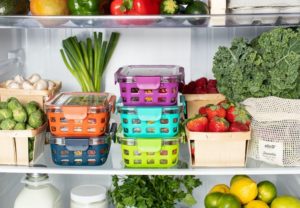28 Feb 2022 Everything Your Business Needs to Know About Disposing of Food Waste
Food waste disposal is a massive issue for UK food businesses. It’s estimated that the food industry in the UK produces 3.6 million tonnes (Mt) of food waste every year – that’s a lot of rubbish, and it has to go somewhere.
What are your food waste responsibilities?
With so much food waste being produced by commercial kitchens and food handling premises, there are many rules and regulations surrounding how to store and get rid of your business’s food waste. It’s your responsibility to understand the law and best practices for food waste and follow them. So, here we outline what your business needs to know about the rules on food waste, handling leftover food, use-by-dates and your responsibilities.
Throwing away food
If your business produces more than 5kg of food waste per week, you must have a separate collection of that waste. You will need to hire a contractor who is registered with your local authority as a recognised food waste disposal company or waste carrier with all relevant permits.
Legislation for waste disposal differs between local authorities. Contact your local authority to find out specific information about how foods must be handled and disposed of.
The ethical disposal of food waste is an important aspect of WRAP’s Food Waste Reduction Roadmap This guidance recommends UK food businesses ensure that surplus food feeds people first, but where it can’t businesses are urged to divert suitable food surplus to animal feed (in line with legislative controls). Alternatively, as much food waste as possible should be repurposed as compost.
Storing food waste
The guidance for the storage of food waste whilst awaiting collection from an LA-approved waste disposal contractor is as follows:
- You must be sure to remove food and other rubbish from rooms where food is stored or prepared.
- Wherever you store it afterwards, it’s essential that all food waste and other rubbish must be put in sealed containers. These containers must be solid, strong, in sound condition and easy to clean.
- Waste must not attract pests or be a source of contamination by touching surfaces that food is stored or prepared on.
Disposing of waste oil
There are specific laws about disposing of waste oil from commercial premises. Only local authority-approved waste oil collectors may collect, transport and dispose of waste oil.
All waste oil awaiting disposal must be stored properly and securely. This means you must use sturdy, sealed containers and never allow oil to spill.
Absolutely no waste oil should be introduced to the drainage system. This can result in blockages, vermin, polluted watercourses and huge structures in sewers composed of solidified fat and other sewer debris called fatbergs. Fat, Oil and Grease (FOG) regulations have been put in place to reduce the impact that fats, oils and grease have on our drainage systems and the environment.
Pouring waste cooking oil down drains in commercial kitchens is a prosecutable offence. Similarly, disposing of cooking oil along with regular waste or food waste is not allowed, even if it is in containers. This can result in spillages, smells, pollution, and vermin and may result in waste contractors refusing to remove waste.
Because food waste is often repurposed as animal feed or used to make compost, the introduction of cooking oil to the waste can result in it no longer being fit for these purposes.
Leftover food
There is no need to dispose of all leftover food, as long as it can be safely reused. Ensure you rapidly cool hot food, cover and refrigerate within two hours.
Ideally, leftovers should be consumed on the same day, but may be used the day after. Ensure all leftover food is labelled and dated. Leftovers can also be frozen on the same day as they are prepared. Any reheating of leftovers should be done to a high temperature, and all reheated food should be disposed of it not eaten immediately.
Food Sharing
There are now many charities and commercial food-sharing and repurposing companies. These businesses and organisations will take surplus food items to donate or sell.
Charities like FareShare, The Trussel Trust, and The Felix Project all aim to reduce food waste and fight poverty and hunger by distributing these foods to people in need. Food sharing apps like OLIO and Too Good to Go enable consumers to collect or purchase foods at small prices or for free.
Food items that are often taken by these organisations include:
- Food that has been rejected for quality.
- Surplus stock
- Samples and line ends
- Stock approaching or already past BBE
- Stock with packaging or labelling errors
Food that is past its use-by date is not appropriate for food sharing, even if it appears to be safe. Sadly these foods must all be discarded as food waste to prevent the possibility of a foodborne illness in the community. Foods that are still safe to eat but past their “best before” date are usually acceptable as these dates denote quality assurance rather than impact safety.
Discover more about safe food storage and disposal information by viewing our Food Safety and Hygiene training options.











